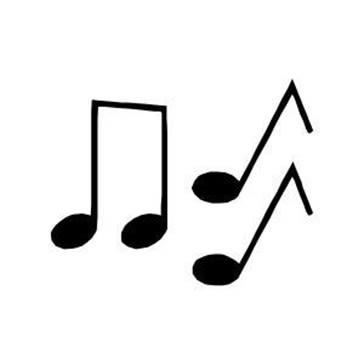LSO Discovery
Friday Lunchtime Concert:
Relaxed performance
Friday 11 June 2021 12.30pm

You can use your phone to view these notes during the concert. Use the menu icon in the top right of the screen to navigate.

Free WiFi
There is free WiFi available in the Jerwood Hall. Connect to the 'hawksmoor' network.
Please Note
Phones should be switched to silent mode. We ask that you use your phone only for reading the notes during the music. Photography and audio/video recording are not permitted during the performance.

Friday 11 June 2021
LSO Discovery Lunchtime Concert:
Relaxed performance
Wolfgang Amadeus Mozart First movement from String Quartet No 17, 'The Hunt'
Lucy Hale Four Folk Tunes
Giacomo Puccini Crisantemi
Sergei Prokofiev Final movement from String Quartet No 2
Julián Gil Rodríguez violin
Maxine Kwok violin
Sofia Silva Sousa viola
Daniel Gardner cello
Rachel Leach presenter
Angie Newman BSL interpreter
This performance is broadcast live on youtube.com/lso. Available to watch for free after broadcast. Recorded at LSO St Luke's in COVID-19 secure conditions.
Captions courtesy of StageText.

Makaton symbols are used with the kind permission of The Makaton Charity, all rights reserved.
© The Makaton Charity 2020. Makaton is a registered Trade Mark and Service Mark of TMC.
Support the LSO's Future
The importance of music and the arts has never been more apparent than in recent months, as we’ve been inspired, comforted and entertained throughout this unprecedented period.
As we emerge from the most challenging period of a generation, please consider supporting the LSO's Always Playing Appeal to sustain the Orchestra, assist our recovery from the pandemic and allow us to continue sharing our music with the broadest range of people possible.
Every donation will help to support the LSO’s future.
You can also donate now via text.
Text LSOAPPEAL 5, LSOAPPEAL 10 or LSOAPPEAL 20 to 70085 to donate £5, £10 or £20.
Texts cost £5, £10 or £20 plus one standard rate message and you’ll be opting in to hear more about our work and fundraising via telephone and SMS. If you’d like to give but do not wish to receive marketing communications, text LSOAPPEALNOINFO 5, 10 or 20 to 70085. UK numbers only.
Wolfgang Amadeus Mozart (1756–91)
First movement from String Quartet No 17 K458, 'The Hunt'
✒️ 1784 | ⏰7 minutes

1 Allegro vivace assai
Wolfgang Amadeus Mozart, taught by his father, began composing aged just five. He was famous around Europe by the age of eight and, by his death at age 35 had displayed genius in everything he wrote. His String Quartet No 17 is one of the so-called ‘Haydn’ quartets written in 1784. Mozart had struck up a great friendship with the older composer, Joseph Haydn, and was much impressed by his string quartets. As a response he wrote a set of six string quartets in the same style and sent them to Haydn with a dedication to him, his new ‘father’. Haydn was overwhelmed by the invention and genius of the works, and declared Mozart to be the greatest living composer of the age. This one is nicknamed ‘The Hunt’ due to its jaunty opening theme.
Note by Rachel Leach
Lucy Hale (1994–2021)
Four Folk Tunes
✒️2017 | ⏰5 minutes

Manchester-based composer Lucy Hale was, in her sadly short life, a hugely influential figure. Diagnosed with a neuromuscular disability at a young age she had to use a wheelchair and often required ventilatory support. This did not stop her becoming an important new voice in the musical world and a mentor and activist for others. Her mother, Nicola, tells us the background to Four Folk Tunes:
'There is a story to this piece. Lu wrote it and had it performed and recorded for me as a present for my 60th birthday. Her dad and I backpacked round the world before our two daughters were born. We were on a shoestring, so Christmas had to be minimal. By fluke we gave each other the same cassette: Van Morrison and the Chieftains Irish Heartbeat. It went on to become the soundtrack to the girls’ childhoods, and was often on in the car and at home. When Lu presented me with this arrangement, I was chuffed to bits.'
Note by Rachel Leach
Lucy Hale
1994–2021

Born in 1994, Lucy was an extraordinary force for good, never letting the disability she lived with limit her musical dreams. She shone at composition in her days attending the Royal College of Music Junior Department, and proceeded to study at the Royal Northern College of Music as an undergraduate with Adam Gorb and David Horne, and as a postgraduate with Gary Carpenter and Emily Howard. She graduated from her Masters in 2019 with a distinction.
In a few short years she achieved so much: she was the inaugural Young Composer in Association with BSO Resound, Young Composer in Residence with Orchestras for All, and a dedicated Associate Musician with Drake Music. She brought such energy and curiosity to every pursuit, and had a seemingly endless appetite for collaboration and innovation. She wrote music for choreographers, film, for the opening of the high-profile venue HOME in Manchester, and for flautist Kathryn Williams’ album Coming up for Air released by NMC Recordings.
She received commissions from Drake Music in partnership with the London Philharmonic Orchestra, Orchestras for All, the National Open Youth Orchestra, Lasham Music Festival, Feelgood Theatre Productions and the Royal Northern College of Music. Lucy's works have been performed at venues including the Barbican Centre, Institute for Contemporary Arts, Manchester Cathedral, The Place, Queen’s Hall Edinburgh and the Imperial War Museum North.
As a Rosie Johnson RPS/Wigmore Hall Apprentice Composer, Lucy was due to write a new work for performance at Wigmore Hall. Instead, in the planned concert on 4 June 2021, one of her existing works Sustain and Snap for cello was performed in tribute to her.
Her compositions give a clear picture of a composer whose imagination knew no constraints: from the wintry brilliance of the flute quartet Zeta to the incendiary drama of the orchestral work To Run With The Tigers. With such confidence, each work takes us straight into its own captivating sound world.
One need only look at her Twitter feed or writing on her website to get a sense of Lucy’s signature passion: she had an eloquent, positive, reasoned voice beyond her years on matters of equality, access and creativity. Whatever Lucy had to say, it was always full of heart and wit, and always worth hearing.
Tribute courtesy of the Royal Philharmonic Society
Giacomo Puccini (1858–1924)
Crisantemi
✒️1890 | ⏰7 minutes

Giacomo Puccini’s music is instantly recognisable due to its often extremely romantic and luscious sound. He was born in Lucca in Tuscany and became the fifth generation of his family to make a living in music. Whilst working as an organist, Puccini walked 18 miles to Pisa to see a performance of Verdi’s opera Aida. Immediately afterwards he decided to become an opera composer. His operas are now the most frequently performed in the world. This short string quartet movement from 1890 is one of his rare non-operatic pieces and was composed in a single night in memory of his friend the Duke of Aosta. Crisantemi means Chrysanthemums.
Note by Rachel Leach
Sergei Prokofiev (1891–1953)
Final movement from String Quartet No 2
✒️1942 | ⏰8 minutes

3 Allegro
Sergei Prokofiev began piano lessons at the age of three and was writing music almost before he could write words. He completed his first opera aged nine, and entered the St Petersburg Conservatoire three years later, eventually studying orchestration with the great Russian master, Nikolai Rimsky-Korsakov. Prokofiev's music was regarded as extremely modernist and avant-garde but now, looking back, audiences find a quirky mix of the old and the new.
This, his second string quartet, was written in 1942 during an extremely dark time for the composer. He had been evacuated to the town of Nalchik with other artists for ‘protection’ by the Soviet authorities against impending Nazi air raids. While there he was ordered to write a quartet using local folk themes. This was the result with the final movement possibly containing more anger than his commissioners expected!
Note by Rachel Leach
Artist Biographies

Julián Gil Rodríguez
LSO Principal Second Violin


A violinist from Bogotá, Colombia, Julián Gil Rodríguez has held positions in the Orquesta Sinfónica de Colombia, Orquesta Sinfónica de Galicia, Spain, and since 2013 has been a proud member of the LSO, with whom he has had the pleasure of travelling the world making music. Julián tremendously enjoys the popular music scene which has led him to perform in London venues such as Ronnie Scott’s and Jazz Café. In his free time he can be found on his bike trying to keep up with his friends.
Maxine Kwok
LSO First Violin


Maxine Kwok began her professional orchestral career touring America with the Norwegian Chamber Orchestra and the Academy of St Martin-in-the Fields while an undergraduate at the Royal Academy of Music. She successfully auditioned for the LSO String Experience scheme and became a permanent member of the First Violin section after graduating with an ARAM and first class honours degree.
Maxine can be seen on YouTube in duo concerts and masterclasses filmed at LSO St Luke’s, and also on the LSO Play web app. Maxine is keen on sharing her musical experiences with the younger generation and has enjoyed coaching the National Children’s Orchestra of Great Britain and the Mediterranean Youth Orchestra in Aix-en-Provence. She has written articles for and been interviewed by Classic FM, the Violin Channel, the Strad, Musical Orbit and Bachtrack among others. Maxine has also recently enjoyed hosting and presenting shows for Scala Radio.
Sofia Silva Sousa
LSO Viola


Sofia Silva Sousa is a Portuguese viola player. She holds a Bachelor's degree from the Royal Academy of Music (2018) where she studied with James Sleigh and Martin Outram, and a Master's degree from the Royal College of Music (2020), having studied with Nathan Braude. She has been an Artist in Residence at the Queen Elizabeth Music Chapel since 2018, under the guidance of Miguel da Silva, where she is the recipient of a generous scholarship from an anonymous donor.
Sofia performed her solo debut concerto with the Portuguese Symphony Orchestra in 2016, and the Orquestra Gulbenkian in 2018, after being awarded Prémio Maestro Silva Pereira (Portuguese Young Musician of the Year). Sofia is a member of the Tejo String Quartet, and started an apprenticeship in 2020 at the Conservatoire à Rayonnement Régional de Paris. Sofia became a Member of the LSO in 2020.
Daniel Gardner
LSO Cello


Daniel Gardner began playing the cello at the age of six, and by the time he was eleven he had a won a scholarship to attend the Royal College of Music Junior Department studying with Joan Dickson and Margaret Moncrieff. During his time at the RCMJD Daniel was successful in many competitions, including gaining first prize in the Gordon Turner memorial prize. Daniel went on to study at the senior department of the RCM with Steven Doane, winning first prize in many cello and chamber music prizes. After studying in the US and Manchester, Daniel joined the BBC Philharmonic Orchestra and later made the move to London as number four cello with the Philharmonia Orchestra, before becoming a member of the LSO.
Angie Newman
BSL interpreter

Angie Newman has worked extensively across music and deaf education for many years. Her knowledge and expertise in these areas, combined with her skills as both a British Sign Language interpreter and a musician, enable her to make music more accessible to young deaf people and adults, bridging the worlds of deafness and music, something she feels passionate about.
She has worked for six successive years with the BBC interpreting family Proms, including CBeebies Proms. She works with a variety of leading orchestras in the UK, including the London Symphony Orchestra, London Philharmonic Orchestra, Philharmonia Orchestra and many others, interpreting for their education and community programmes. Angie loves to relax by walking, cycling, playing the piano and violin, and practising yoga.
In today's concert, Angie will be adapting her British Sign Language interpretation to include more visual and gestural elements.

Next Lunchtime Concert
Friday 18 June 12.30pm

Tippett Songs for Ariel
Handel Where Shall I Fly from 'Hercules'
Wolf Heimweh; Gebet; Nimmersatte Liebe
Korngold Glückwunsch
Schubert Des Sängers Habe
Fauré La lune blanche luit dans les bois from 'La bonne chanson'
Howells King David
Tosti La Serenata
Guildhall Singers & Pianists
Katie Macdonald mezzo-soprano
Connor-James Smith tenor
Michael Lafferty-Smith baritone
Matthias De Smet piano
Janice Tsui piano
Thomas Eeckhout piano
Rachel Leach presenter
Join us in the Jerwood Hall by booking a free ticket in advance. Available from 10am Friday, two weeks prior to each concert.

The London Symphony Orchestra is hugely grateful to all the Patrons and Friends, Corporate Partners, Trusts and Foundations, and other supporters who make its work possible.
The LSO's return to work is generously supported by DnaNudge.

